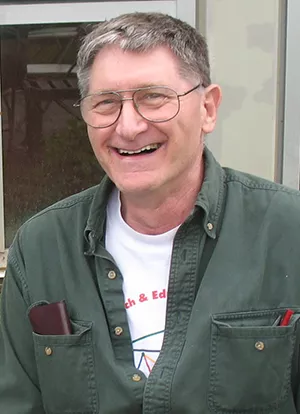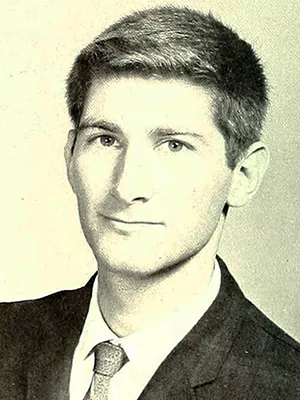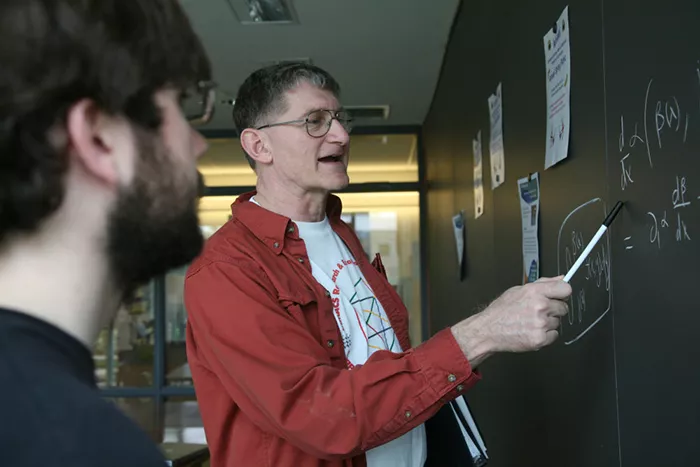In Honor of Emeritus Mathematics Professor Steve Maurer '67

President Valerie Smith shared the following message with the campus community on Friday, August 27:
Dear Friends,
With deep sadness, I write to share the news that Stephen Bennett Maurer ’67, the Neil R. Grabois ’57 Professor Emeritus in the Natural Sciences and Engineering, died Wednesday after a long illness. He was 75.
Steve, who served on the faculty for 38 years, is remembered for his extraordinary passion for and commitment to teaching mathematics. Early in my tenure as president, Steve warmly welcomed me to the College, a place he clearly loved. After that first meeting, I remember wishing that I had been taught mathematics by someone with his gifts when I was in college.
Steve is survived by Frances Stier, his wife of 39 years; his sons, Leon and Aaron; and one grandchild. A funeral will take place this Sunday, Aug. 29, at 11 a.m. at Congregation Ohev Shalom in Wallingford, Pa., followed by a Zoom shiva service at 7 p.m.; please email ajmaurer89@gmail.com for the link. In lieu of flowers, please direct any gifts to MathPath, a summer program for middle school students that Steve served as a longtime teacher and administrator.
I invite you to read more below about Steve and his many contributions to our community.
Sincerely,
Val Smith
President

In Honor of Emeritus Mathematics Professor Steve Maurer ’67
Stephen B. Maurer ’67, the Neil R. Grabois ’57 Professor Emeritus in the Natural Sciences and Engineering, died Wednesday at age 75. With his passing, Swarthmore has lost one of its most admired and influential community members, whose impact on math education ran deep both on and off campus.
“Steve was a born leader, one who brought energy and goodwill to any leadership role he held, and his dedication to teaching is legendary,” says Retired Professor of Mathematics and Statistics Deb Bergstrand. “His students would always get the best he had to offer. I have such respect for him and his legacy as a dedicated colleague and all-around fine human being.
“Steve had an absolutely incredible mathematical intellect, and his ability to explain a mathematical concept was extraordinary,” says Associate Professor of Mathematics Ralph Gomez. “The mathematical explanations he gave were always enthusiastic, extremely clear, and above all exceedingly simple. You couldn't help but learn deeply from his explanations.”
“As chair of our department, Steve brought remarkable energy to the job, along with a lot of patience,” says Professor and Chair of Mathematics Aimee Johnson. “He was a real inspiration and role model, the quintessential Swat alum.”
Maurer was born in Washington, D.C., and grew up in Silver Spring, Md., the oldest of three boys. Fascinated as a child by puzzles and solving problems, he also discovered early on a talent for explaining math to others and resolved in middle school to be a professor.
“I was attracted by the black-white certainty of mathematics in what otherwise for me was a gray and confusing world,” Maurer said. “Only much later did I come to appreciate gray, both outside mathematics and within it."
At Swarthmore, where Maurer was drawn to its small size, beautiful campus, and coeducation, he graduated Phi Beta Kappa and with highest honors as a math major with minors in philosophy and linguistics.
“I was very happy as a student, studying away,” he said. “There was no overt academic competitiveness; everyone set high standards, but grades were never discussed. Almost everyone I knew well wanted to be a professor. Today, Swarthmore students are still very scholarly, but there is a much wider background of where they come from and what they want to do. I think this greater breadth is a good thing.”

Maurer, seen here in the 1967 edition of The Halcyon, graduated Phi Beta Kappa and with highest honors as a math major with minors in philosophy and linguistics.
After graduating in 1967, Maurer pursued graduate studies at Princeton University, where he earned an M.A. in 1969 and a Ph.D. in 1972 with a thesis in combinatorics titled “Matroid Basis Graphs,” taking a leave in between the degrees to teach math at Phillips Exeter Academy. After completing a postdoctoral fellowship at the University of Waterloo in Canada, he returned to teach at Princeton before joining Swarthmore’s faculty in 1979.
For nearly 40 years at Swarthmore, Maurer taught classes at all levels including calculus, linear algebra, statistics, and discrete mathematics, his specialty. Professor of Mathematics Cheryl Grood describes those classes as “legendary among Swarthmore students” and credits them with bringing “a large number of students into the discipline.”
Maurer also relished opportunities to serve his department and the larger campus community. As associate provost for information technology in 2000–03, he helped to introduce the campus to the Blackboard course-management software, the progenitor of Moodle, as well as to develop the College’s intellectual property policy. He also chaired the Mathematics Department, first for a year in the early 1990s and again from 2004 to 2011.
“Being chair fits in with my interest in general educational issues,” he said, “and seems to fit in with my penchant to generate lots of emails.”
Although serving as chair meant dealing with, and saving others from, what Maurer called the “nitty gritty,” it also meant helping the department reach consensus on a number of changes, including a revision of its program.
“Even in dissent, he would accept, adopt, and even advocate the thinking behind the majority decision without resentment or regret; he was ready to move on and look ahead,” says longtime colleague and Professor Emeritus of Mathematics Don Shimamoto. “I don't think it’s right to say that Steve had no ego, but, while he had strong personal opinions, evidently his conviction to support the communities in which he participated was even stronger.”
As chair, Maurer also enjoyed the opportunity to recruit and mentor younger colleagues.
“What I will remember the most about Steve is the advice and encouragement he gave to me, especially during a time when my professorial career was full of self-doubt and uncertainty,” Gomez says. “I will always be grateful for having known him and thankful for the immensely positive impact he had upon my life."
“I joined Swarthmore due in part to Steve’s recruitment efforts, and his dedication to the students and the College was inspirational to me as a newcomer to the liberal arts,” says Nsoki Mavinga, associate professor of mathematics and statistics. “His faith in my ability to teach Swarthmore students assured me that I could be successful here.”
Maurer was also chair when Associate Professor of Statistics Lynne Schofield ’99 was hired. “I was one of the lucky few who had the privilege of being both Steve’s student and colleague,” she says. “Steve taught me in two classes my sophomore spring at Swarthmore and was instrumental in my decision to be a math major. He spent countless hours making sure I had everything I needed to succeed, both as a student and later as a new faculty member. I will miss his wise counsel and his assiduous work ethic.”
“Steve was a mentor to me,” says Professor of Statistics Steve Wang. “As my longtime chair, I appreciated dealing with him because he was always a straight shooter. As a colleague, I admired his pedagogy and scholarship. I once sat in on one of his classes and marveled at how skillfully he led students through a difficult problem, serving as a guide but letting them make their own discoveries.”
There is no question that Maurer enjoyed talking about mathematics. Another longtime colleague, Professor Emeritus of Mathematics Charles Grinstead, says over their 34 years on the faculty together, they spoke about mathematics on hundreds of occasions.
“In mathematics, as in other disciplines, we are always trying to understand why certain things are true,” he says. “Like students, sometimes mathematics professors have trouble constructing such proofs. When I got stuck, I usually went to Steve.”
Although Maurer was a senior member of the department when Johnson, the current chair, came in 1994, she says he was not resting on his laurels. Instead, she says, he was “always trying new things and getting involved in new activities.”

Maurer often asked students to write what he referred to as their “mathematical autobiography” — and always willingly offered his own in return.
Those numerous activities included many years working in several capacities on behalf of the Mathematical Association of America (MAA), including their editorial board. In the 1980s, he spent two years at the Sloan Foundation where, as a program officer involved with the foundation’s New Liberal Arts Program, he encouraged academic institutions to promote the use of quantitative and mathematical methods throughout their curriculum. Maurer also devoted many years to MathPath, a program for mathematically gifted middle school students, and continued to serve the organization after retiring from the College in 2017.
Maurer co-authored the first edition of Discrete Algorithmic Mathematics, a well-known and highly regarded college textbook, in 1991, as well as a substantially revised third edition in 2005. Among a wide-ranging number of articles and reviews, he was also the co-editor of The Contest Problem Book V (1997), a collection of high school exams and additional material from his years running MAA competitions, including the U.S. Math Olympiad.
Maurer had a long-held interest in writing mathematics. For a 1980 article titled “The King Chicken Theorems,” about possible patterns in pecking order results, he received an MAA award for “expository excellence.” Decades later and in response to increased interest in mathematical writing but a lack of commensurate resources for undergraduates, he wrote A Short Guide to Writing Mathematics, which he made available for free upon request to students and educators.
Long fascinated by how a person’s past experiences shaped their path in mathematics and in life more generally, Maurer often asked students to write what he referred to as their “mathematical autobiography” — and always willingly offered his own in return. “The more you learn about the adults around you,” he told his students, “the more experiences you can draw upon in choosing your own future.”
Grood says that although he retired four years ago, “department colloquia still feel incomplete without Steve asking the speakers what drew them to pursue their particular subfield of mathematics.”
Maurer eagerly shared his passion for math, and for service in general, with the broader Swarthmore community. He developed math-enrichment activities and materials for Swarthmore-Rutledge School, Strath Haven Middle School, and Strath Haven High School, where he also developed a linear algebra course and lectured in calculus. Maurer also served as a local Cub Scout and Boy Scout leader and on the boards of Trinity Cooperative Day Nursery and the Swarthmore Swim Club.
Shimamoto says that when reflecting on “Steve’s long and impressive record of professional service — to the department, the College, the mathematics community — behind it all was a generosity of spirit that I came to respect a great deal and for which I was grateful many times.”
Maurer is one of the few who participated in the Honors Program in three ways: as a student, as an examiner (twice in the 1970s), and as a faculty member. He drew upon those experiences to offer advice to those involved in the program throughout his career, telling students that examiners are not trying to “trip them up” but trying to understand how they think. He would also encourage examiners to put students at ease by letting them choose the first thing to discuss.
“Most of all, I tell students: ‘You will survive; see, I’m still here.’”



